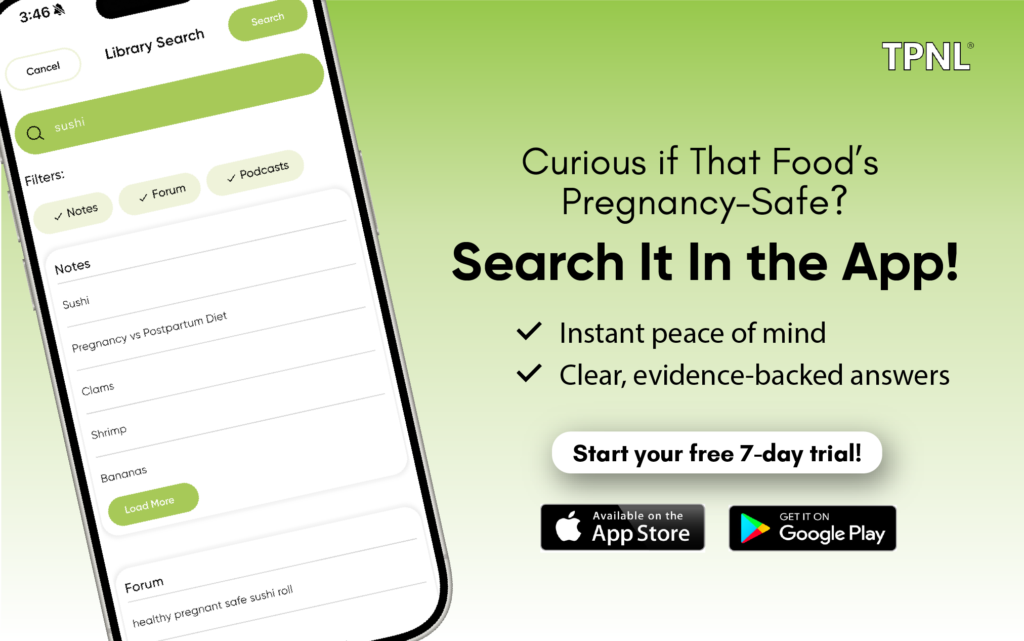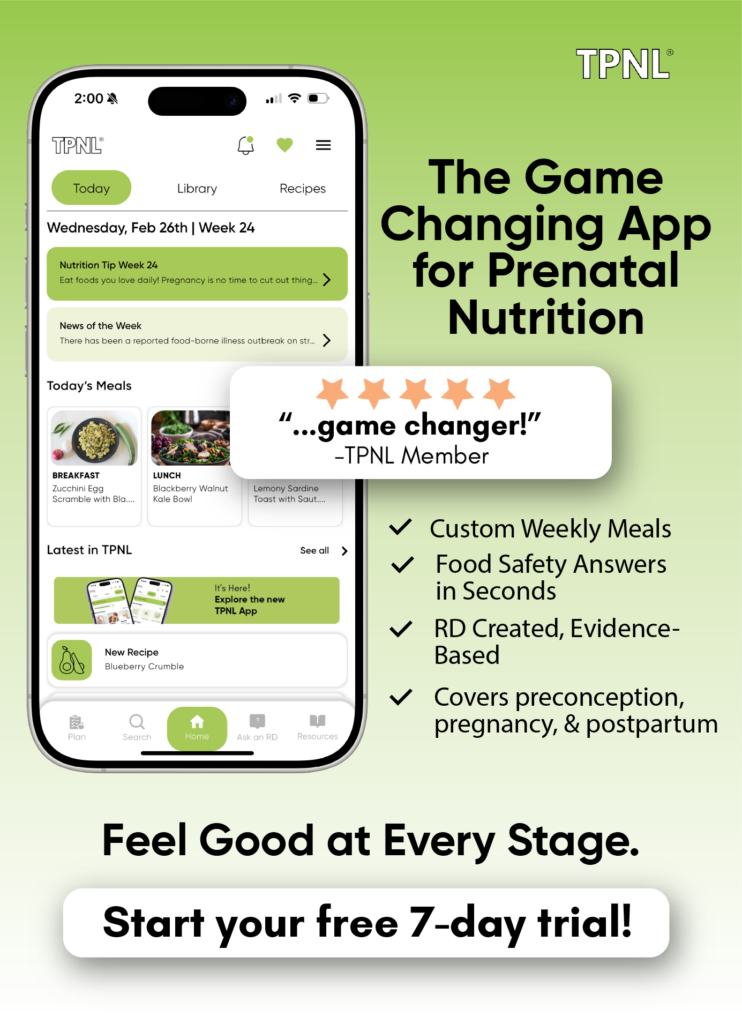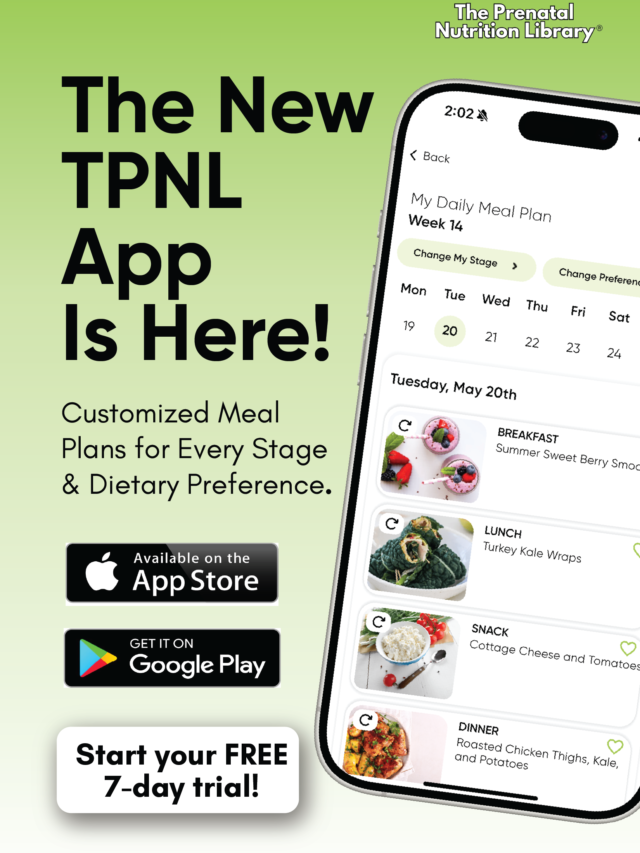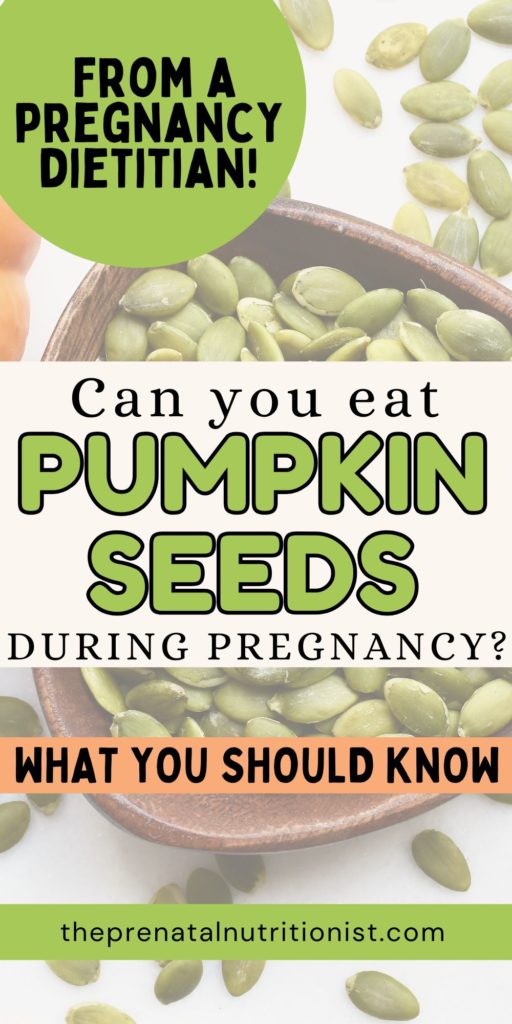
Pregnancy nutrition is often summed up as “eating for two,” but we encourage thinking about it as nourishing for two. The choices you make not only fuel your own health and energy, but also supply the building blocks your baby needs for healthy growth and development.
There are countless nourishing foods you can enjoy during pregnancy, but today we’re highlighting one that often gets overlooked: pumpkin seeds. These tiny powerhouses are rich in essential nutrients, simple to incorporate into meals or snacks, and can safely fit into your pregnancy diet.
In this post, we’ll explore why pumpkin seeds deserve a place on your pregnancy plate. We’ll discuss how to enjoy them safely, their health benefits, and the unique advantages they offer during pregnancy.
Pumpkin Seeds For Pregnant Women: Are They Safe?
Pumpkin seeds, also known as pepitas, are tiny seeds harvested from pumpkins that pack a powerful nutrient punch. They’re valued for being a rich source of essential vitamins and minerals, healthy fats, plant-based protein, and even a bit of dietary fiber.
Adding pumpkin seeds to your diet during pregnancy can be an easy way to boost nutrition. Try sprinkling them over salads, blending them into smoothies, stirring them into oatmeal, or even incorporating them into baked goods.
When enjoyed in moderation as part of a balanced diet, pumpkin seeds can help support your baby’s growth while promoting your health and well-being.
So, what makes them so special? Let’s take a closer look.
Pepitas vs. Pumpkin Seeds: What’s The Difference?
You may have noticed the terms “pumpkin seeds” and “pepitas” used interchangeably, but there are actually a few key differences:
- Pumpkin seeds: Typically harvested from larger pumpkins, these seeds have a white outer shell. They’re often eaten roasted or raw with the shell intact.
- Pepitas: These are the green, shell-free seeds you’ll usually find in snack mixes or recipes. Without the tough outer shell, pepitas are easier to chew and digest. This is a plus if you’re dealing with morning sickness, sensitive gums, or just want a gentler option.
Both forms contain protein, quality fats, and important minerals like zinc and magnesium. Pepitas tend to be enjoyed more often since they’re simpler to eat in larger amounts without causing digestive discomfort.
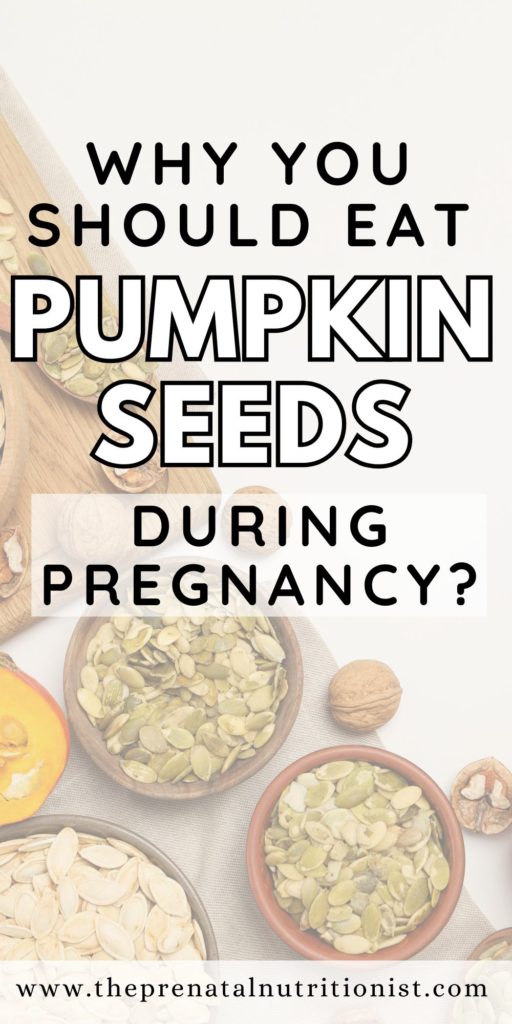
What Are Pumpkin Seeds Good For?
Pumpkin seeds offer a variety of health benefits during pregnancy thanks to their nutrient-rich profile. Here’s a quick overview before we dive deeper:
- Supports digestion: Whole pumpkin seeds (with the shell) provide dietary fiber, which can help ease constipation, a very common pregnancy complaint.
- Plant-based protein: Pepitas are a convenient source of plant protein, essential for fetal growth, tissue repair, and keeping you satisfied between meals.
- Quality fats: They contain heart-healthy monounsaturated and polyunsaturated fats, including some omega-6s. While not a major source of omega-3s, the fats they provide contribute to overall maternal and fetal health.
- Anti-inflammatory nutrients: Compounds like vitamin E and fats may help reduce inflammation and support general wellness during pregnancy.
- Magnesium: This nutrient plays an important role in regulating blood pressure, reducing the risk of leg cramps, and supporting bone strength for both mom and baby.
- Zinc: Supports immune health, cell growth, and fetal development, making it especially valuable during pregnancy.
Are Pumpkin Seeds Good For Pregnant Women?
Experts agree that eating a wide variety of nutrient-rich foods is one of the best ways to meet the increased demands of pregnancy, and pumpkin seeds definitely fit the bill. They’re especially valuable because they provide two key minerals, magnesium and zinc, which are essential in maternal health and fetal development.
Magnesium helps keep blood pressure within a healthy range while supporting muscle and nerve function, and zinc is essential for cell growth, immune health, and maintaining healthy skin. Including pumpkin seeds in your snacks or meals a few times per week is a simple way to boost your intake of these nutrients.
Keep in mind that pumpkin seeds alone will not meet your nutrient needs. It’s still important to incorporate a wide variety of other nutrient-rich foods.
For even more inspiration, check out our post on pumpkin for pregnant women!
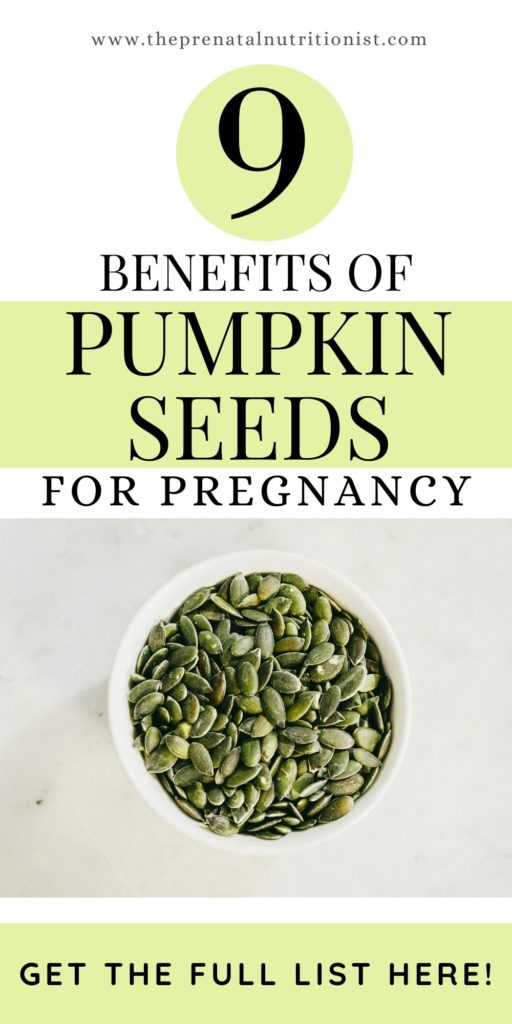
What Are The Benefits Of Pumpkin Seeds For Pregnant Women?
Promotes Healthy Digestion
Pumpkin seeds contain dietary fiber, which can help keep digestion moving smoothly and reduce the risk of constipation. This is a common complaint during pregnancy. A healthy gut also supports nutrient absorption and affects immune function.
Supports Heart Health
With their mix of fats, antioxidants, and magnesium, pumpkin seeds contribute to heart health. This is especially important during pregnancy, when your heart works harder than ever. These nutrients can help support circulation and may positively affect cholesterol balance.
Contributes to a Healthy Pregnancy
The combination of magnesium, zinc, protein, fats, and antioxidants makes pumpkin seeds a well-rounded addition to a prenatal diet. Their nutrient profile supports overall wellness, while anti-inflammatory compounds may help ease common pregnancy symptoms like swelling.
Strengthens the Immune System
Pumpkin seeds are naturally rich in zinc, a mineral that plays a critical role in immune function. A strong immune system helps protect both mother and baby from illness and supports healthy fetal development.
Promotes Restful Sleep
Pumpkin seeds provide tryptophan, an amino acid that the body uses to make melatonin, aka the “sleep hormone.” Paired with magnesium, which supports relaxation, they may help promote better sleep and ease restlessness at night.
Supports Baby’s Brain Development
While not a significant source of omega-3s compared to fatty fish, pumpkin seeds supply quality fats and essential amino acids that support brain and nervous system development. These nutrients play a crucial role in learning, memory, and motor skill development.
Helps Regulate Blood Pressure
Magnesium is well known for keeping blood pressure within a healthy range. Since high blood pressure can increase the risk of pregnancy complications, consuming more magnesium-rich foods like pumpkin seeds can be beneficial.
Boosts Energy Levels
Packed with protein, quality fats, and key minerals, pumpkin seeds provide steady, lasting energy. They can be an excellent choice to prevent the mid-afternoon energy crash.
Provides Essential Nutrients
From magnesium and zinc to iron and healthy fats, pumpkin seeds deliver a wide range of nutrients that are especially important during pregnancy. Their compact size makes it easy for them to sneak extra nutrition into snacks and meals.
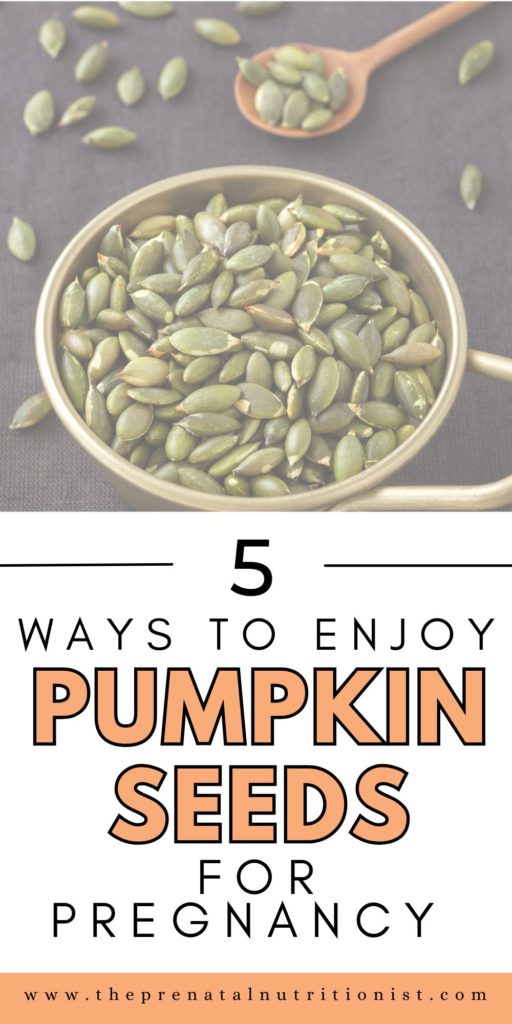
How To Eat Pumpkin Seeds During Pregnancy
Add Them to Meals
Sprinkle pumpkin seeds over salads, yogurts, oatmeal, and even stir-fries! They add a little texture and boost the nutritional value of everyday meals. This is a simple yet nutritious way to kick your meal up a notch.
Blend Into Smoothies
Did you know you can blend pumpkin seeds into your favorite smoothies? They won’t change your smoothie’s flavor but add a solid amount of magnesium and zinc. Pair with fruit, protein powder, and leafy greens for a nutritious meal or snack.
Use in Baking
Add pumpkin seeds to homemade muffins, granola bars, or breads. This is a simple way to sneak in some extra nutrients without drastically altering the taste. If you’re wondering about eating other seeds during pregnancy, see this post on poppy seeds and pregnancy.
Snack on Them Raw
Raw pumpkin seeds are an easy, shelf-stable snack. Keep a small bag in your handbag or desk drawer for an easy source of protein and healthy fats. They pair great with an orange or an apple.
Roast for Extra Flavor
Lightly roasting pumpkin seeds can make them crunchier and more flavorful. Adding some salt can also boost the flavor and your mineral consumption.
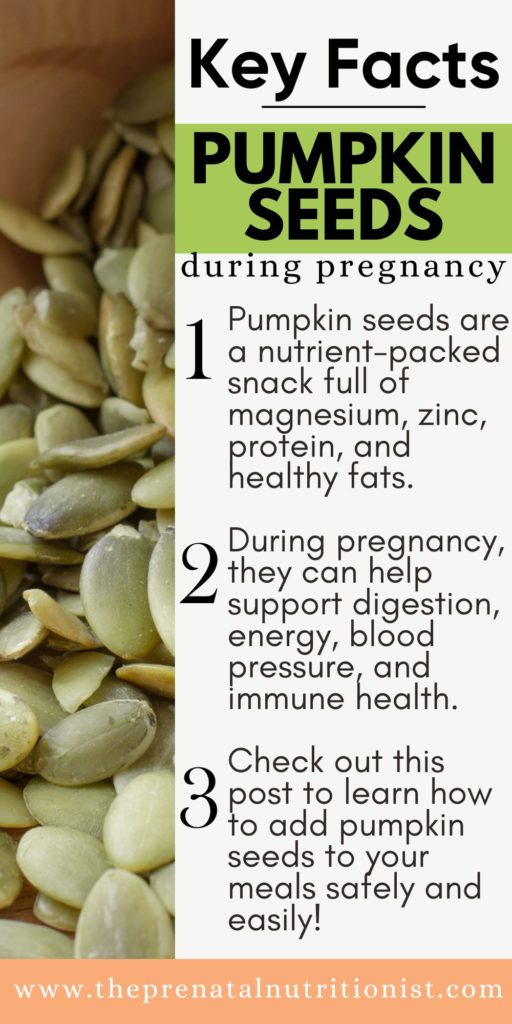
Take out the guesswork with The Prenatal Nutrition Library App!
Pumpkin seeds are a great snack for pregnancy! They offer quality fats, essential nutrients, and anti-inflammatory compounds that support both maternal health and developing fetuses. From promoting healthy blood pressure to supporting your heart health, they provide a range of benefits, making them a wonderful addition to your pregnancy diet.
If you want to feel confident in your nutrition before, during, and after pregnancy, sign up for The Prenatal Nutrition Library App today! All new users start with a 7-DAY FREE TRIAL. You’ll get a custom meal plan and instant access to our pregnancy food checker, so you have complete peace of mind.
